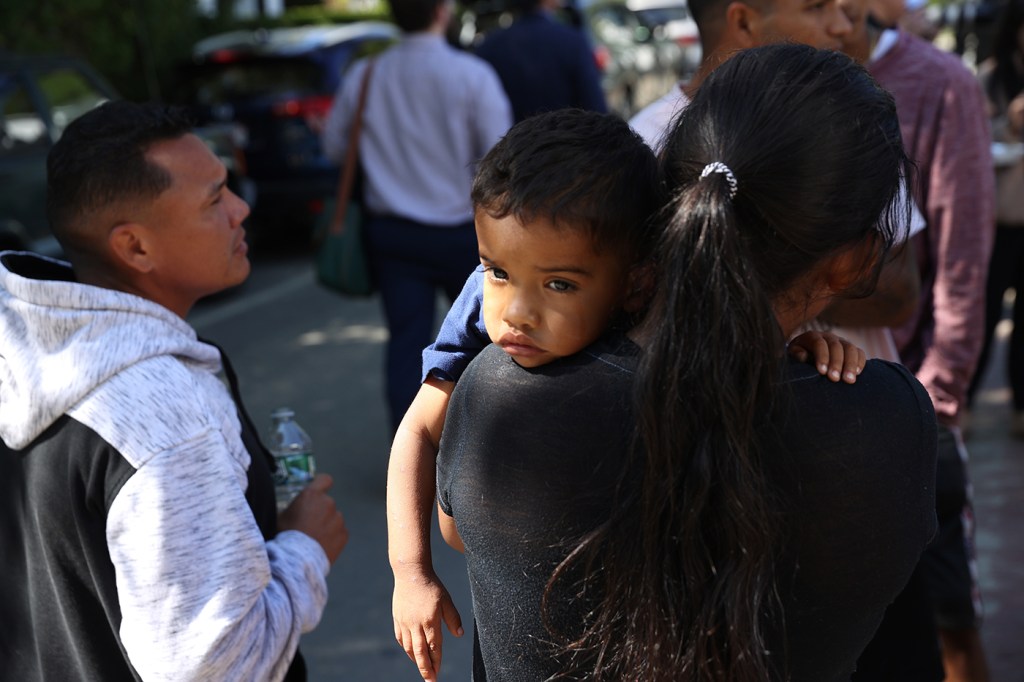Did Ron DeSantis violate human trafficking laws by sending migrants to Martha’s Vineyard?

Two planes carrying about 50 migrants primarily from Venezuela, sent by Florida Gov. Ron DeSantis, arrived unexpectedly and without advance notice at an airport on Martha’s Vineyard on Thursday, sending local officials into a scramble to make accommodations and deploy resources to help.
In an apparent political stunt meant to highlight the crisis at the southern border, DeSantis claimed responsibility for the relocation, criticizing President Joe Biden’s policies and justifying the move on the basis of Massachusetts’ status as a “sanctuary state.”
“We are not a sanctuary state, and it’s better to be able to go to a sanctuary jurisdiction, and yes, we will help facilitate that transport for you to be able to go to greener pastures,” DeSantis said.
Many current and former politicians—including Hillary Clinton—condemned DeSantis’s actions, with some suggesting they amount to human trafficking. But do they?
“It’s an interesting question,” said Amy Farrell, director and professor of criminology and criminal justice at Northeastern.

Farrell says that human trafficking claims are adjudicated through a federal statute established in 2000 called the Trafficking Victims Protection Act, which lays out methods for prosecuting traffickers and protecting victims. In cases that involve human trafficking, prosecutors must accordingly prove that victims were “recruited, harbored, transported … obtained … for labor or services” by means or use of “force, fraud or coercion.”
“To me there’s clearly fraud associated here, and potentially coercion,” Farrell says. “In this case, it is clear to me at least that the 50 or so individuals thought they were going to go to Florida—and that’s the assumption of DeSantis also—then diverted with the promise of good jobs and work and support services in Massachusetts.”
According to NPR, DeSantis said migrants were identified in Texas “as wanting to relocate to Florida” before signing release forms to go to Massachusetts, raising questions about whether they truly consented.
Underpinning the federal law, Farrell says, is an “action, means and purpose” model of determining prosecutable violations.
“The [action], here, was that [the migrants] were transported or diverted from where they were originally traveling, and the [means] was that it was done so fraudulently,” Farrell says.
But the “purpose,” which under the federal labor trafficking statute is to “extract labor,” is less clear, she says.
“There could be a financial purpose in it” in that Florida could be financially benefiting by not having to provide shelter, legal aid and other assistance to the migrants, Farrell says. States like Florida and Texas receive a tremendous amount of federal funding that is set aside to assist migrants, she says. It cost the sunshine state a little over $600,000 to move the migrants as part of a $12 million immigration relocation program.
Florida then, “would be materially benefiting from the fraudulent movement of migrants,” she says.
Among the funding sources DeSantis used to ship the dozens of migrants: the interest earned on Florida’s federal COVID-19 relief, The Washington Post reports.
Either way, the situation is unprecedented, Farrell says—and outlines “undeniable human rights violations.”
“The most important thing is that, whether this is considered trafficking or not, this is clearly a human rights violation, and there should be legal remedies both for the 50 or so individuals brought to [Massachusetts], and potential liability for the state of Florida,” she says.
It’ll be interesting, Farrell says, to see if Massachusetts takes action against Florida, as the New England state “may have a case here” to request that Florida return its federal resources. Massachusetts officials have already called for a federal probe into DeSantis’s relocation scheme.
The migrants themselves may qualify for “some special immigration status,” such as being able to obtain a T-visa, a temporary immigation benefit reserved for victims, as a result of the scheme, Farrell says. Victims of human trafficking may also be allowed to “stay in the U.S.” for up to four years, “receive work authorization and/or begin to take steps toward getting a green card,” she says.
Massachusetts state Sen. Julian Cyr, whose district includes Martha’s Vineyard, told News@Northeastern that, as of Friday, the migrants had been temporarily relocated to Joint Base Cape Cod.
“The underlying premise of this stunt, which amounted to manipulating vulnerable families, was that Massachusetts would not want anything to do with these migrants,” Cyr says. “The response was just the opposite—there was an outpouring of support.”
Cyr says local and state officials have ensured that the migrants have access to health care, including dental care and emotional support, housing resources and legal assistance.
“The focus remains on stabilizing these families and giving them a place to be for a while,” he says.
For media inquiries, please contact media@northeastern.edu.





